Vital Tips for Integrating Minimalism right into Your Personal and Specialist Life
Vital Tips for Integrating Minimalism right into Your Personal and Specialist Life
Blog Article
Understanding Minimalism: Techniques for Lowering Clutter and Enhancing Clearness in Everyday Living
Minimalism is significantly recognized as a feasible strategy to enhancing clarity and emphasis in today's cluttered globe. By methodically reviewing our possessions and focusing on intentionality, we can develop rooms that not only show our worths but likewise promote mental well-being. Utilizing methods such as the "Four-Box" technique can help with a much more well organized environment, yet real challenge lies in growing a minimal mindset that sustains these initiatives. Exploring the subtleties of this ideology might expose shocking understandings into how you can change your day-to-day live. When you embrace this willful simplicity?, what might you uncover.
Defining Minimalism and Its Advantages
Defining minimalism involves understanding it as a lifestyle option that stresses simplicity and intentionality in both daily regimens and physical ownerships. At its core, minimalism motivates people to prioritize what genuinely matters, enabling a more significant and focused existence. By removing the non-essential, minimalism welcomes people to engage deeply with their experiences and environments.
The advantages of taking on a minimal method are diverse. First of all, it fosters psychological quality, as decreasing mess in one's setting can bring about reduced disturbances and stress. Individuals frequently report enhanced focus and boosted productivity when bordered by fewer ownerships. Second of all, minimalism promotes monetary flexibility; by prioritizing requirements over desires, people can make more enlightened getting decisions, causing potential savings and minimized financial debt. A minimalist way of living can yield emotional advantages, as it urges people to grow gratitude for what they have instead than yearning for more.
Eventually, minimalism is not merely about worldly decrease however entails an alternative change in perspective, promoting a life identified by purpose, balance, and fulfillment. Embracing this lifestyle can result in extensive changes in just how people communicate and regard with the globe around them.
Analyzing Your Present Clutter
Clutter usually manifests as an overwhelming accumulation of products that no longer offer a function, developing an obstacle to attaining a minimal way of living. To properly evaluate your present clutter, it is vital to embrace a methodical method. Begin by determining the areas in your living area that really feel overwhelming or disorderly. Remember of particular groups of things, such as apparel, publications, or kitchenware, as this will assist you recognize the extent of the clutter.
:strip_icc()/HopeAustinKeough03-65387902a06c421eb0b55cd34f8e0485.jpg)
Furthermore, take into consideration the frequency of usage for each thing. Eventually, recognizing your present mess is a critical step towards accepting minimalism and improving clarity in your everyday living.

Practical Decluttering Techniques
Having actually evaluated your existing clutter, the following step is to apply useful decluttering methods that assist in an even more arranged living area. Minimalism. One effective technique is the "Four-Box" strategy, where you designate four boxes labeled: keep, give away, trash, and relocate. This method encourages fast decision-making and guarantees items are categorized properly
An additional strategy is the "One in, One out" guideline, which stipulates that for each brand-new product acquired, an existing thing has to be removed. This concept assists preserve equilibrium and avoids build-up in time. In addition, take into consideration the "30-Day Minimalism Video Game," where you get rid of one product on the initial day, two on the second, and so forth, cumulatively promoting a feeling of success.
For those who battle with emotional attachments to ownerships, the "Nostalgic Worth" method can be useful. Limitation on your own to a certain number of treasured things, enabling you to value their relevance without overwhelming your area. Develop a routine decluttering timetable, whether monthly or seasonally, to preserve a clutter-free setting. By employing these methods, you can develop a much more calm and effective home, eventually improving quality in your day-to-day life.
Developing Deliberate Rooms
Creating willful spaces includes a thoughtful strategy to how we design and organize our atmospheres, Visit Your URL making certain each area offers a details objective and mirrors our worths. This technique is essential in cultivating a feeling of quality and objective in our every day lives. By critically evaluating the function of each area, we can get rid of diversions and improve our general well-being.
To create willful rooms, start by determining the primary activities that will take place in each location. A linked here home office need to be developed to foster productivity, incorporating aspects such as adequate lights, comfortable furnishings, and minimal disturbances. In comparison, a relaxation area ought to promote serenity, including relaxing shades and comfortable seats.
Additionally, take into consideration the psychological impact of your surroundings (Minimalism). Incorporating personal products that resonate with your values, such as art work or plants, can enhance the link to your area. Consistently evaluate these environments to ensure they continue to serve their intended purpose as your needs advance
Inevitably, creating willful areas has to do with making conscious options that straighten with your way of living, advertising harmony and performance in your living and working environments.
Preserving a Minimalist Way Of Thinking
Welcoming a minimalist state of mind calls for recurring representation and intentionality in our ideas and activities. Establish apart time to assess your dedications, properties, and even digital content, ensuring they line up with your core principles.
One more secret technique is to exercise gratefulness. Acknowledging what you currently have fosters satisfaction and reduces the wish for extra. This shift in viewpoint encourages recognition for simplicity, improving general wellness. Integrating mindfulness methods, such as reflection or journaling, can further reinforce a minimal frame of mind by promoting clarity and decreasing mental clutter.
Furthermore, establish boundaries to shield your energy and time. Find out to say no to non-essential obligations and distractions that do not contribute to your personal development. Border yourself with like-minded people that sustain your minimalist trip, as shared values can enhance inspiration and responsibility.
Conclusion
In final thought, accepting minimalism provides substantial benefits, consisting of lowered clutter and enhanced quality in day-to-day life. The principles of minimalism serve as valuable tools weblink for cultivating a setting that supports individual growth and wellness.

In addition, think about the "30-Day Minimalism Video Game," where you remove one product on the very first day, two on the 2nd, and so forth, cumulatively cultivating a feeling of success.
In verdict, accepting minimalism offers significant benefits, including lowered clutter and boosted clarity in daily life.
Report this page